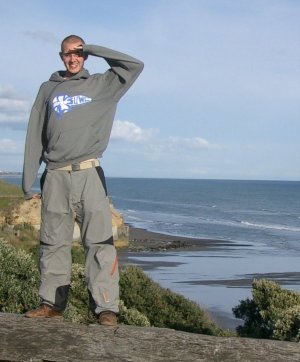Rob Mills: Difference between revisions
From Santa Fe Institute Events Wiki
No edit summary |
No edit summary |
||
| (7 intermediate revisions by the same user not shown) | |||
| Line 1: | Line 1: | ||
[http://users.ecs.soton.ac.uk/rmm05r/ I'm] a graduate student in the Natural Systems research group at the University of Southampton, in the UK. My answers to Dan Rockmore's questions below are a good introduction to my research, so I shan't repeat myself here. I have a general love for the outdoors, and in my free time I enjoy travelling and many sports (hiking/running/skiing/biking..) and juggle too. | |||
I am very much looking forwards to meeting all of you out in Santa Fe! | |||
My email address is: rob.mills@zepler.net | |||
My room extension is: 4160 | |||
[[Image:Rmm-kai-iwi.JPG | right]] | [[Image:Rmm-kai-iwi.JPG | right]] | ||
---- | |||
My Project links | |||
*[[The_pollination_network_wiki_page| Pollination Model]] | |||
*[[HP_Modularity| Host-pathogen modularity]] | |||
---- | |||
'''1. what are your main interests? Feel free to include a "pie in the sky" big idea!''' | '''1. what are your main interests? Feel free to include a "pie in the sky" big idea!''' | ||
Latest revision as of 14:05, 31 January 2009
I'm a graduate student in the Natural Systems research group at the University of Southampton, in the UK. My answers to Dan Rockmore's questions below are a good introduction to my research, so I shan't repeat myself here. I have a general love for the outdoors, and in my free time I enjoy travelling and many sports (hiking/running/skiing/biking..) and juggle too.
I am very much looking forwards to meeting all of you out in Santa Fe!
My email address is: rob.mills@zepler.net My room extension is: 4160

My Project links
1. what are your main interests? Feel free to include a "pie in the sky" big idea!
My thesis research aims to understand evolutionary processes and how we can exploit these in a computational problem-solving sense. More specifically, I am interested in modelling macro-evolutionary trends such as the major transitions in evolution through symbiotic (and ultimately symbiogenic) relationships. Understanding under what conditions symbiotic associations will form, and what selective advantages exist for the composite entities formed in this manner are key questions in my work. Considering these same ideas from an engineering perspective, I am looking at how the combination of pre-adapted genetic material in collaborative groups can provide a bottom-up approach to automatic problem decomposition.
One of my long-term aims for this research is to develop general methods that can identify & reveal decompositions automatically in a broader class of systems, including those where a solution is not trivial even when a decomposition is known. Indeed a strong motivator is from engineering a solution to a medical application, where I believe the very simplistic decomposition used could be significantly improved upon.
My thesis aside, I am interested in almost any evolutionary process; the evolutionary biology that I have been exposed to fascinates me.
2. What sorts of expertise can you bring to the group?
I have working knowledge of evolutionary algorithms, and artificial life modelling. My understanding in evolutionary biology is limited to processes, rather than knowledge of any biological systems in particular. Whilst not obviously relevant, I have had some exposure to silicon chip design and testing. The systems-level design and general design methodology does influence the way that I approach a problem. On a very technical front, I can program in a few languages (c, matlab, perl).
3. What do you hope to get out of the CSSS?
I look forward to developing my knowledge in the theory of networks and non-linear dynamics, and in more general I'd like to improve the rigour of the approach I take to understanding complex systems.
I hope to be exposed to complex systems study from disciplines outside my own: I'd like to find out what else I could get involved in later in my career (not much later!), using the skills and understanding that I have developed through my thesis research.
4. Do you have any possible projects in mind for the CSSS?
I am drawing close to the end of my doctoral research, and I'd really like to use the opportunity of working with researchers from the broad set of disciplines that complexity brings together to explore questions that I am not intimately familiar with. For instance, I'd be very keen to pursue a project that asks questions in ecology, financial markets, or climate modelling.
